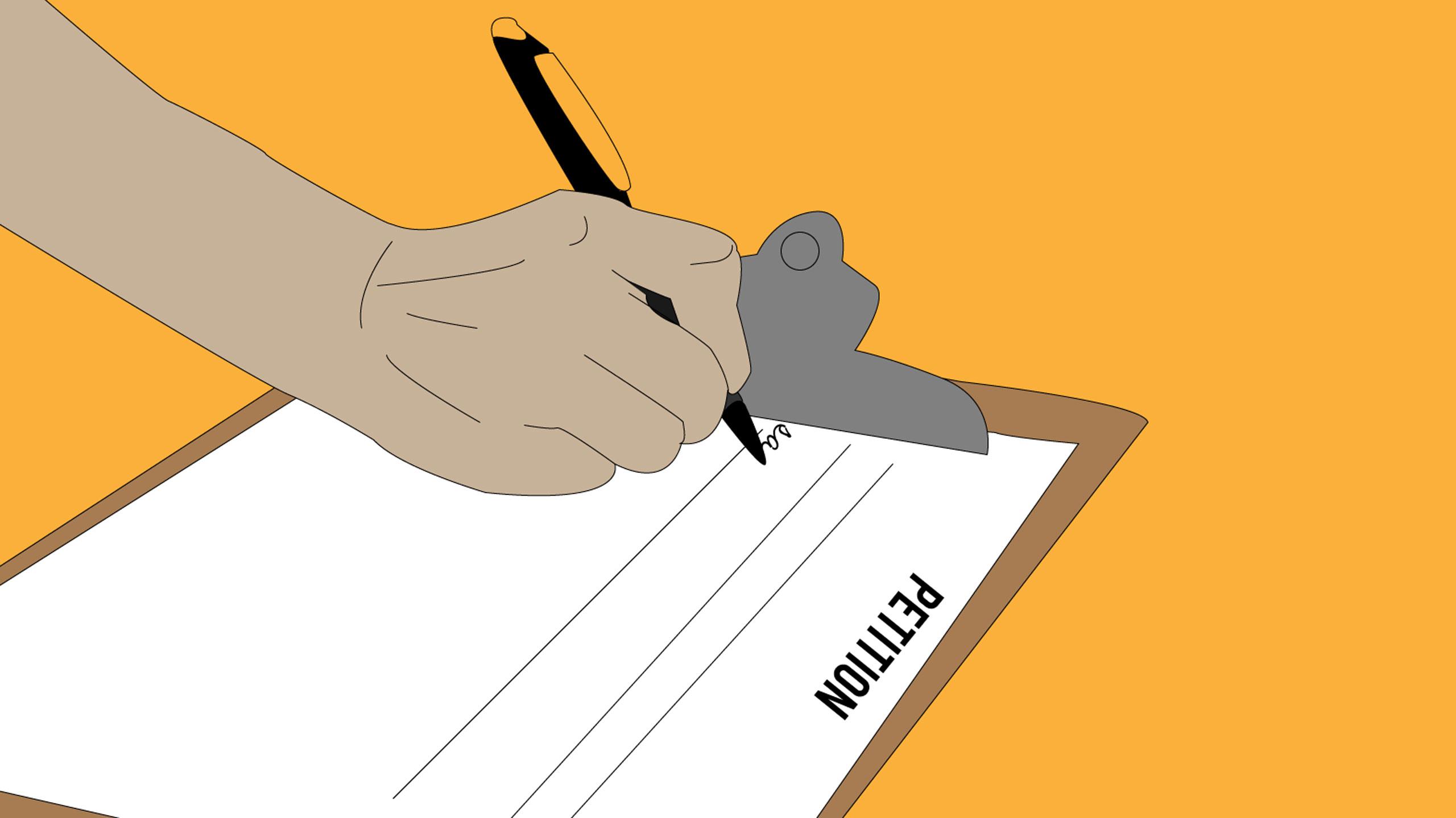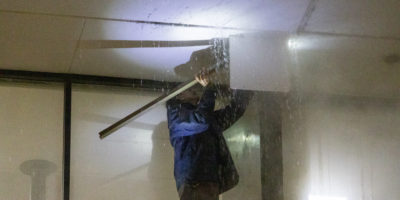By Pooja Rambaran
Alumni of the Ryerson Students’ Union (RSU) created a petition called “Respect RSU” in light of the recent termination of the 1986 Operating Agreement between Ryerson and the students’ union.
“The main goal [of the petition] is that the administration needs to recognize that the student union as an entity needs to be and remain independent and student-run,” said Greg Quinn, former president of the RSU in 1989-90.
In January, The Eyeopener reported that vice-provost, students Jen McMillen said the university has no plans to reinstate the RSU. “We’ve made our position clear around the fact that we have terminated our agreement with the current Ryerson Students’ Union,” said McMillen in an interview with The Eye.
The petition condemns the actions taken by the university, as outlined in a statement released by the RSU on Jan. 28. It addresses Ryerson president Mohamed Lachemi and other Ryerson administration members.
It was also sent out to fellow RSU alumni members and representatives from the Ryerson Faculty Association, Canadian Union of Public Employees (CUPE) and Ontario Public Service Employees Union.
In the RSU statement, president Vanessa Henry said the university withheld the student union’s funds. The RSU’s student issues and advocacy coordinator is no longer allowed to represent students in academic misconduct hearings, according to the statement.
The petition raised additional concerns against the formation of a new student government as proposed by the university and the appointment of a lead process officer alongside the Student Government Selection Process Committee.
“Only the students, independent of interference by university staff, can determine the structure of the organization that best represents their interests. RSU is that democratically-determined organization,” wrote the RSU alumni in the petition.
“We encourage the university to include the rest of the Ryerson indepedent, democratic representatives…to find solutions”
Representatives of CUPE 233 shared their support for the RSU and encouraged the university administration to renegotiate a new operating agreement with the RSU in an email sent to Lachemi and other administration members on Feb.11.
“We also encourage the university to include the rest of the Ryerson independent, democratic representative[s] in these discussion[s] to find solutions and accountability frameworks that respect [the] student unions’ autonomy,” wrote CUPE 233 representatives in the email.
In response to the petition, Lachemi said in an interview with The Eyeopener that he respects the autonomy of organizations like Continuing Education Students’ Association of Ryerson and the RSU, but the issue is more rooted in the lack of transparency exhibited by the union representing Ryerson students.
“Ryerson students deserve an independent government that is dedicated to transparency, financial management, good governance,” Lachemi said. “I’m not seeing that and this is why [the administration] made that very difficult decision.”
He noted that Ryerson students have an opportunity to decide on a new student government structure that best represents the leadership that they want to have and the university has no intention of telling students what’s best for them.
“It’s really important studnts have representation, so to have this summarily dismissed was really distressing”
According to the RSU alumni and petition organizers, the Respect RSU petition was born out of their collective frustration and shock at the sudden termination of the agreement as well as their personal involvement with the students’ union.
More than 20 previous RSU executives and board members have signed the petition so far, said Quinn.
“[The] RSU has been the official elected government for [a] long [time] and this agreement has been going on since 1986,” said Victoria Bowman, who was RSU president in 1996-97. “It’s really important students have representation, so to have this summarily dismissed was really distressing.”
“[Student unions] can advocate internally and externally for students in ways that universities themselves don’t and by interfering in this way, they are muzzling elected officials,” Bowman said.
Bowman was one of the main organizers of the petition alongside several other former RSU presidents, including Janet Piper (1990-91), Ken Marciniec (2003-04), Muhammad Ali Jabbar (2006-07 and 2008-09), Nora Loreto (2007-08) and Ben Lewis (2005-06 and 2009-10).
“Ryerson and specifically [the] RSU played a huge part in my development as a leader [and] as someone who is a contributing member of the community,” Jabbar said. “I believe having a strong and independent student body that is there to protect the students and advocate on students’ behalf is very important,” he added.
Jabbar acknowledged that members of the previous RSU administration who were directly involved in the financial mismanagement should be rightfully punished. However, he said he found the collective punishment of the student body “a little reckless” and “[an] overreach of authority.”
Quinn recalls an incident in the ‘70s when a few RSU executives “didn’t run the finances the way they should’ve” and “ran up a bit of a debt.”
In 1970, Barry Hales, president of the RSU, then called Students’ Union of Ryerson Polytechnical Institute (SURPI), left behind a debt estimated at between $24,000 and $50,000, according to Ronald Stagg in the book Together for Change.
“This debt was from the actions of past presidents, a series of loans to needy students that could not be repaid, and a costly program of dances and guest speakers that Hales instituted,” Stagg said.
Hales was followed by Micheal Walton as president and David Guptill as vice-president who together dealt with the financial issues and came out of the year with a surplus.
They did so by cutting dances and concerts for the year, letting go of field social workers, demolishing an unprofitable coffee house and creating money-making activities, like pub nights and movie nights.
“It’s not like the student union and the administration haven’t actually been through this before”
“It’s not like the student union and the administration haven’t actually been through this before, where there’s a little bit of difficulty and they end up figuring it out…the student union did it in a self-determining way,” Quinn said.
However, Quinn said that a student group—what’s supposed to be a separate entity from the university—loses its independence when it’s run by the university. Given that the process to establish a new student government is being organized by Ryerson, student representation could be at risk.
Third-year business management student Badr Saliba said she felt it was reasonable for the university administration to express concern over the RSU’s management of accounts, but found the termination of the operating agreement to be extreme. Regardless, she doesn’t feel it’s worth signing a petition over.
“I probably wouldn’t support [the petition] because I never used or participated in anything that the RSU has so it doesn’t concern me personally,” she said.
“I feel like the people that probably do benefit from it would obviously be for it but I feel like it’s not that big of an issue that they would need to have a petition.”
On the other hand, business management student Caroline Joanes said that the university’s decision to terminate the agreement was “a little harsh” and she would sign the petition in support of the RSU.
“I’m a fifth-year so I’ve gotten to see a lot of things [the RSU] has done for students in the different programs,” Joanes said.
Like Joanes, second-year journalism student Charmaine Tan said she felt that it was unfair for the university to step in as the RSU is a separate organization. She said the student representatives are capable of handling their finances and making their own decisions.
“I think if I were an alumni, I’d definitely feel very sad that the voices of the students aren’t represented especially in this time where they need to be represented by something,” Tan said.
She added that the students’ union offers a body that the university administration can communicate with, and without it, students would not be able to find justice.












Leave a Reply